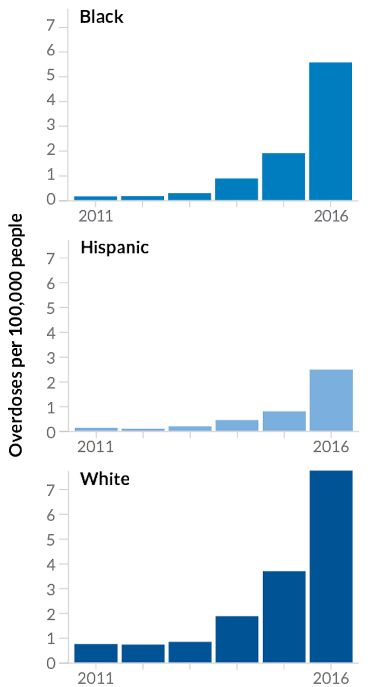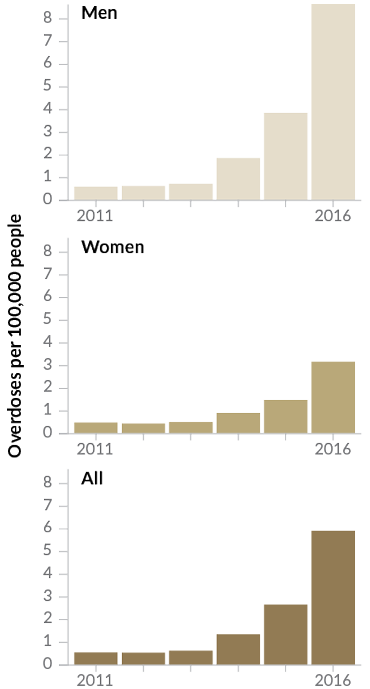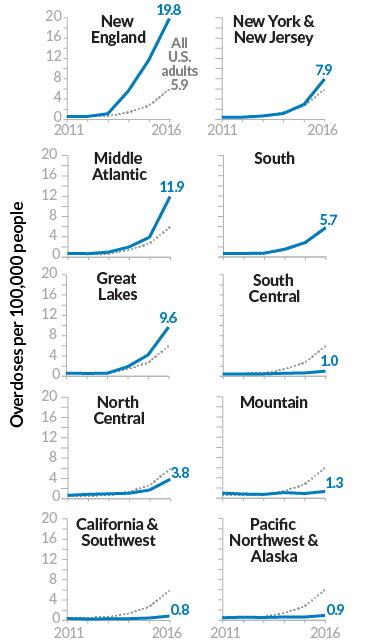U.S. fentanyl deaths are rising fastest among African-Americans
Whites still have the highest death rate

ON THE RISE Overdoses from fentanyl, a synthetic opioid, are growing fast among African-Americans and Hispanics, the U.S. Centers for Disease Control and Prevention reports.
Hailshadow/iStock/Getty Images Plus
Since people in the United States began dying in the fentanyl-related drug overdose epidemic, whites have been hit the hardest. But new data released March 21 by the Centers for Disease Control and Prevention show that African-Americans and Hispanics are catching up.
Non-Hispanic whites still experience the majority of deaths involving fentanyl, a synthetic opioid. But among African-Americans and Hispanics, death rates rose faster from 2011 to 2016. Whites experienced a 61 percent annual increase, on average, while the rate rose 140.6 percent annually for blacks and 118.3 percent per year for Hispanics. No reliable data were available for other racial groups.
Overall, the number of U.S. fentanyl-related deaths in 2011 and 2012 hovered just above 1,600. A sharp increase began in 2013, reaching 18,335 deaths in 2016. That’s up from 0.5 deaths per 100,000 people in 2011 to 5.9 per 100,000 in 2016.
In the first three years of the data, men and women died from fentanyl-related overdoses at similar rates, around 0.5 per 100,000. But in 2013, those paths diverged, and by 2016, the death rate among men was 8.6 per 100,000; for women it was 3.1 per 100,000. Overdose death rates rose most sharply along the East Coast, including in New England and the middle Atlantic, and in the Great Lakes region.
One of the most powerful opioids, fentanyl has been around for decades and is still prescribed to fight pain. But it has emerged as a street drug that is cheap to make and is found mixed into other drugs. In 2013, fentanyl was the ninth most common drug involved in overdose deaths, according to the CDC report; in 2016, it was number one. Just a little bit can do a lot of damage: The drug can quickly kill a person by overwhelming several systems in the body (SN: 9/3/2016, p. 14).
Drug deaths
By 2016, fentanyl-related drug overdoses among blacks and Hispanics had started to catch up to non-Hispanic whites. The death rate for blacks rose 140.6 percent annually, on average, to 5.6 deaths per 100,000 people in 2016, and Hispanics’ rate rose 118.3 percent, to 2.5. Whites remain the most affected group, with a rate of 7.7 deaths per 100,000 people, an annual increase, on average, of 61 percent over the same period.
Drug overdose deaths involving fentanyl, by race (2011–2016)


From 2011 to 2013, the death rates among men and women from fentanyl-related drug overdoses were similar and hovered around 0.5 deaths per 100,000 people. But deaths among men started growing faster in 2013, and reached a rate of 8.6 per 100,000 in 2016, nearly three times the rate for women. Researchers aren’t sure why. The overall death rate grew from 0.5 deaths per 100,000 in 2011 to 5.9 in 2016.
Drug overdose deaths involving fentanyl, by sex (2011–2016)


Eastern and Midwestern U.S. states have been the most affected by the fentanyl epidemic, particularly New England, while western states have seen much lower increases in overdose deaths. In 2016, deaths rates ranged from 0.8 per 100,000 people in the public health region that includes California, Hawaii and the Southwest to 19.8 per 100,000 in New England.
Drug overdose deaths involving fentanyl, by region (2011–2016)


Source: CDC







